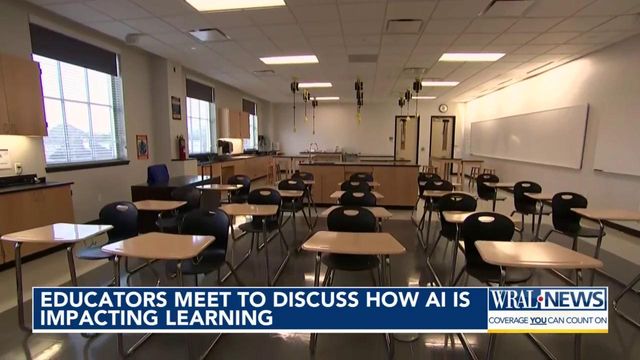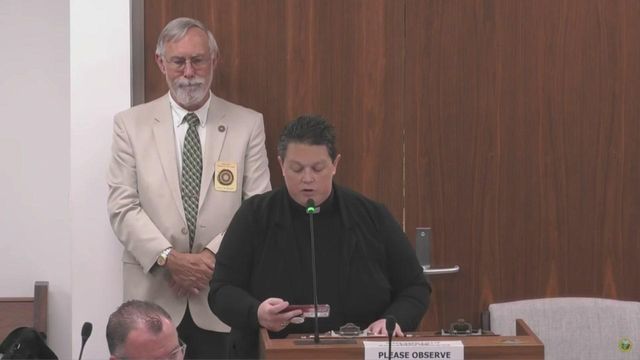North Carolina schools should embrace AI now or risk falling behind, experts tell teacher group
Artificial intelligence isn’t going away, and schools need to be ready to use and teach artificial intelligence, a panel of experts told the Governor’s Teacher Advisory Committee on Friday.
But educators must be thoughtful in how they embrace it, by making sure all students have access to it and making sure student data is protected and private, as required by federal law. Experts said they should also be skeptical with the results artifical intelligence generates.
“AI’s not going to replace teachers,” said Allison Reid, Wake County Public School System director of digital learning. “Teachers who use AI may replace teachers who do not.”
The panel and committee convened just three days after the North Carolina Department of Public Instruction issued guidance for educators on how to use artificial intelligence, encouraging teachers to learn it and schools to incorporate it at all grade levels.
Some North Carolina schools have banned some artificial intelligence tools, such as ChatGPT.
Artificial intelligence-powered tools designed for education are already coming out, said Jonathan Rowe, senior research scientist and managing director of the NSF AI Institute for Engaged Learning at North Carolina State University. In five years, many may be used at scale, in every school, he said. In 10 years, artificial intelligence could power tools we can’t fathom right now.
The Wake school system is teaching middle and high school students how to use artificial intelligence, helping them understand how to use the technology that’s quickly permeating everyday lives.
But it’s critical for teachers, too. Experts said teachers can use it to tailor learning toward children who are learning curriculum differently. It can also help teachers generate lesson plans more quickly.
“Ai is the first thing I’ve ever seen that actually gives teachers time back,” Reid said.
Artificial intelligence is code that uses existing data to create things or do things, when prompted. It performs tasks that resemble human thinking. For example, if a teacher wanted to use artificial intelligence to write a letter of recommendation for a student, the AI would search through all of the data it has about letters of recommendation and then generate a letter that resembles those other letters. The teacher could review the AI-generated letter and edit it to be more personalized for the student.
Knowing how artificial intelligence works is critical to knowing how to use it. AI can generate false information if it finds false information online, or it can show bias by reflecting existing societal biases back in the content it generates.
Artificial intelligence isn’t a replacement for the work, so much as a tool to make it easier or more effective, experts said.
Lisa Godwin, a committee member and beginning teacher coach in Pender County Schools, said she sees many of her early-career teachers use ChatGPT to create lesson plans. Many of them don’t have educational degrees.
Godwin said she has to tell the teachers to take every lesson plan and tailor it for their specific students and their specific needs.
“That is a struggle for many of them,” Godwin said. Teachers still need to make connections with their students.
Artificial intelligence could also help with that personalization process, Jamar Perry, Granville County Schools assistant superintendent of curriculum, instruction and student services, told WRAL News.
"With this new with this tool, we're able to think about how we can differentiate student learning based on their needs, by using some of the information and the tools with AI," Perry said.
Experts and teachers were also concerned about the potential for artificial intelligence to help some teachers and students but to be harder to access for others.
Nashonda Bender Cook, a committee member and high school special needs teacher in Wake County, said she knows from experience and talking with other teachers that many families don’t have Internet at home or that Internet connections in their communities can be spotty. Children who don’t have computers at home may need to turn their school-issued laptops in, sometimes over an entire summer break.
While the large majority of North Carolinians has the ability to buy Internet access, many of them don’t buy it.
Failure to embrace artificial intelligence — and to make it accessible to all students — could keep some schools and students behind others.
“If we don't take any additional steps not to, we will be creating the next digital divide of people that have access to people that don’t, people that know how to operate and design these systems and people who don’t,” said Krista Glazewski, executive director of the Friday Institute for Educational Innovation at North Carolina State University.
The use of artificial intelligence in the classroom will depend to an extent how well anyone knows how to use it. A recent Education Week survey found most teachers don’t use artificial intelligence because they’re too busy doing other things. Even if artificial intelligence could save teachers time, teachers would first have to learn how to use it. The survey found many teachers don’t feel like they have time to learn it.
The department’s guide, which will be updated periodically, includes links to resources for teachers who want to learn more about how to use artificial intelligence. The list includes videos or courses specifically designed for educators. It also includes resources for teachers to use when instructing students on how to use artificial intelligence.











